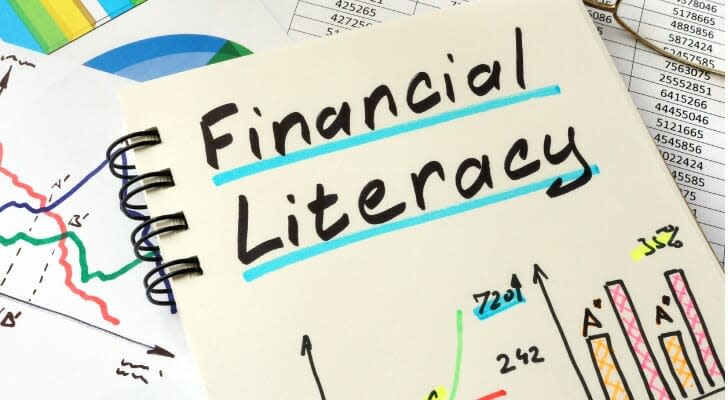
Despite the vast depth of information and education available today, financial literacy isn’t improving among adults in the U.S. A financial advisor can help you improve your financial literacy to better understand your money.
Are you looking for a strong savings rate? Check out SmartAsset’s high-yield savings account comparison tool.
On average, American adults correctly answered only 50% of the questions in the 2022 Personal Finance Index, an annual survey conducted by the TIAA Institute and the Global Financial Literacy Excellence Center (GFLEC) at the George Washington University School of Business.
Since researchers from the TIAA and George Washington University started gauging financial literacy among adults in 2017, functional knowledge hasn’t improved. The area where people struggle the most? Understanding financial risk. Here’s a look at the survey’s findings and some of the questions that were asked.
Financial Literacy Isn’t Improving
Unfortunately, this year’s survey and previous studies have revealed that many adults in the U.S. function with a poor understanding of financial topics. On average, U.S. adults answered only 50% of the index questions correctly in 2022, a figure that has remained steady since 2017.
While only 18% of respondents could correctly answer between 76% and 100% of the 28 questions that were posed in this year’s survey, nearly a quarter of adults (23%) incorrectly answered at least 75% of questions. What’s worse, the percentage of adults with poor financial literacy is on the rise. In 2020, only 17% of respondents got three-quarters of the questions wrong.
Assessing financial risk is the one area where functional knowledge is consistently lowest among U.S. adults, the survey found. Only 36% of questions related to risk were answered correctly, a 3% drop from the first survey in 2017.
“Comprehending risk involves, for example, understanding that the expected outcome in a given scenario depends on the range of possible outcomes, the financial implication associated with each outcome and the likelihood of each outcome occurring,” according to the study.
Which financial topic are American adults most knowledgeable about? Borrowing money. On average, 60% of questions related to borrowing were answered correctly, followed by questions focusing on saving (53%) and consuming (52%), the survey found.
Can You Answer These Questions Correctly?
TIAA shared with SmartAsset a sampling of the questions that respondents were asked as part of the 2022 survey. The questions touch on financial risk, as well as how interest accrues on savings and how it impacts a loan balance. Here are three questions that were part of the 2022 survey:
-
There’s a 50/50 chance that Malik’s car will need engine repairs within the next six months which would cost $1,000. At the same time there is a 10% chance that he will need to replace the air conditioning unit in his house, which would cost $4,000. Which poses the greater financial risk for Malik?
-
Anna saves $500 each year for 10 years and then stops saving additional money. At the same time, Charlie saves nothing for 10 years but then receives a $5,000 gift, which he decides to save. If both Anna and Charlie earn a 5% return each year, who will have more money in savings after 20 years?
-
Jose owes $1,000 on a loan that has an interest rate of 20% per year compounded annually. If he makes no payments on the loan, at this interest rate, how many years will it take for the amount he owes to double? (Possible answers: less than 5 years; 5 to 10 years; More than 10 years; Don’t know)
Answers:
1.Despite the air conditioning repair potentially costing Malik $4,000, the likelihood of a $1,000 car repair is far greater, meaning it poses a more significant financial risk.
2. Anna would have more money after 20 years than Charlie, considering her savings would have a 10-year head start to accumulate interest.
3. If your answer to the third question was “less than 5 years,” you would have been among the respondents who answered it correctly. Without making payments on his car loan, Jose’s loan balance would double within four years.
Why Financial Literacy Matters
The TIAA-GFLEC points to a direct correlation between financial literacy and financial well-being. The more knowledge adults have about the money, the better off they are.
The survey found those with low levels of financial literacy are six times more likely to have difficulty making ends meet compared to adults with high levels of financial literacy. They’re also five times as likely to lack enough emergency savings to cover one month of expenses and three times more likely to be unable to withstand a $2,000 financial shock.
“It is evident again that greater financial literacy tends to translate into higher financial well-being and lower financial literacy is generally associated with lower financial well-being,” the study’s authors concluded.
Meanwhile, a separate study calculated how much a lack of financial literacy could actually be costing someone. At the end of 2021, the National Financial Educators Council (NFEC) conducted a survey among 3,389 adults and found that the average adult loses about $1,389 annually due to a lack of financial knowledge, including personal finance and investments.
Bottom Line
Unfortunately, financial literacy isn’t improving among American adults. On average, respondents to the 2022 TIAA Institute-GFLEC Personal Finance Index correctly answered only half of the questions, a troubling figure that has hasn’t improved since the survey’s first year in 2017. Comprehending financial risk is the one area where adults need the most improvement, as only 36% of questions related to risk were answered correctly in 2022.
Tips for Improving Your Financial Literacy
-
Working with a financial advisor is one of the best ways to improve your understanding of financial topics, including investing, saving and planning for retirement. Finding a qualified financial advisor doesn’t have to be hard. SmartAsset’s free tool matches you with up to three financial advisors who serve your area, and you can interview your advisor matches at no cost to decide which one is right for you. If you’re ready to find an advisor who can help you achieve your financial goals, get started now.
-
SmartAsset has a wealth of reference articles to help you better understand your finances, as well as guides specifically centered on particular topics, including investing, estate planning, taxes and more.
Photo credit: ©iStock.com/ilona titova, ©iStock.com/designer491, ©iStock.com/damircudic
The post 23% of Adults Got Three-Quarters of Financial Literacy Questions Wrong: Can You Get Them Right? appeared first on SmartAsset Blog.
EMEA Tribune is not involved in this news article, it is taken from our partners and or from the News Agencies. Copyright and Credit go to the News Agencies, email [email protected] Follow our WhatsApp verified Channel












